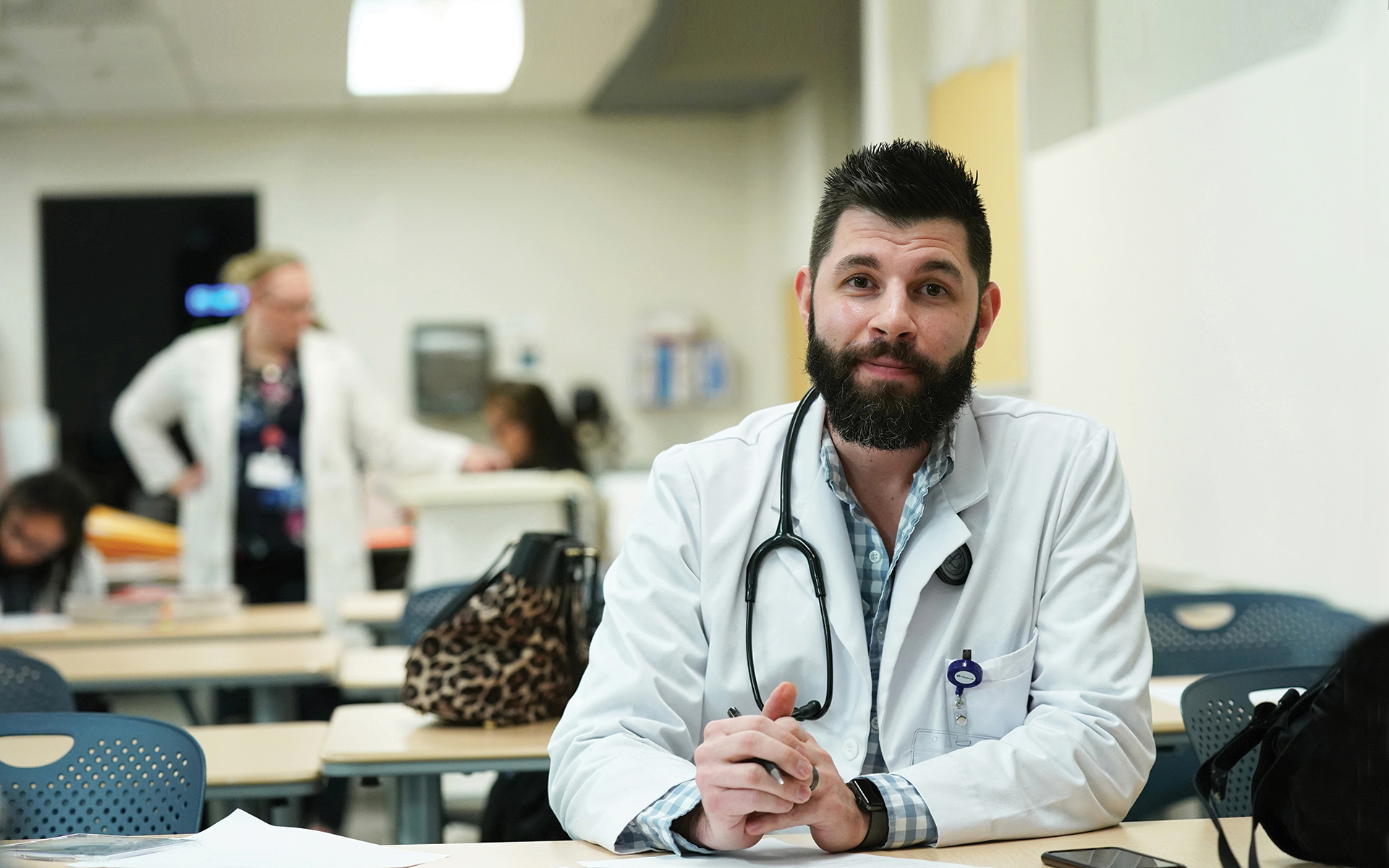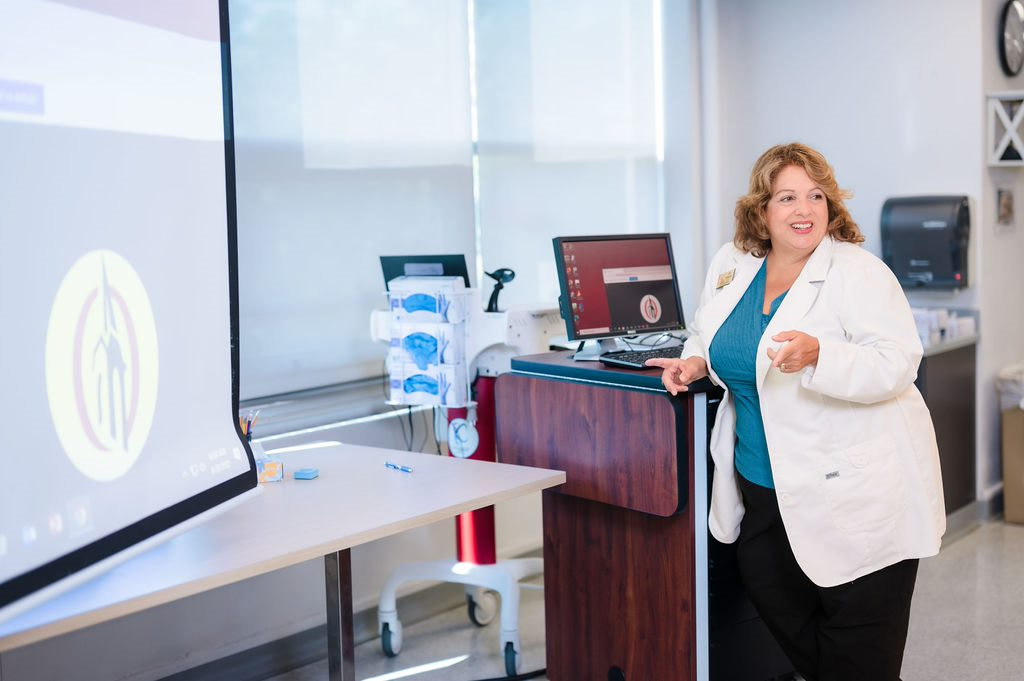Psychiatric & Mental Health Nurse Practitioner (PMHNP)
IMPORTANT NOTICE
Due to the realignment of programs since joining the Coalition for the Common Good, Otterbein University is no longer accepting applications for the Advanced Practice Nurse and Nurse Executive foci of the Master's-Degree-to-DNP academic program, and for the Family Nurse Practitioner and Psychiatric & Mental Health Nurse Practitioner majors in the BSN-to-DNP and the Post-Graduate Certificate academic programs. These programs are in transition and more information will be posted as soon as possible.
GET A STEP AHEAD!
Ease your transition to advanced practice or boost your professional knowledge with graduate non-degree courses at Otterbein in 2025! The Advanced Practice Science Core courses (also known as the 3Ps) are being offered at Otterbein taught by experienced faculty who are also working nurses! Advanced Physical and Health Assessment will be offered Spring Semester, Advanced Pathophysiology will be offered in Summer Semester, and Advanced Pharmacology will follow in Fall Semester. You can take one, two, or all three and get a step up in your practice or in preparation for graduate study.
For registration information, contact Shelby Edick, Assistant Director of Graduate Admission, adams7@otterbein.edu, 614-823-1506.
The PMHNP majors prepare the graduate to work as an advanced practice nurse. The coursework prepares the student to sit for the national board certification exam from the American Nurses Credentialing Center (ANCC) to become a psychiatric/mental health nurse practitioner.
Our curriculum, beginning summer semester each year, is designed as an online program allowing you to study and participate in clinical experiences in your location. The clinical component comprises courses in wellness, therapy, and diagnosis and management of mental illness across the lifespan in outpatient and inpatient settings. Clinical courses are precepted by a practicing mental health professional in your community, arranged by the student with support from faculty and staff.
Upon successful completion of the requirements for certification, either the Master of Science in Nursing degree or the Post-Graduate Certificate is awarded to enable you to take the certification exam and begin working as an advanced practice nurse before you complete your doctorate. Recipients of the MSN may choose to continue for an additional year to complete a scholarly project that leads to the Doctor of Nursing practice degree. Graduates who wish to begin practicing upon earning their MSN degree may return within five years to complete their DNP.
Applications for admission are reviewed once per year by the Nursing Admission Review Committee. The most qualified applicants will be selected on a space-available basis. It may be necessary for some students to take undergraduate courses to meet prerequisites of selected graduate courses.
Candidates that do not meet all the admission criteria, but who wish to be considered for admission must submit a petition requesting special consideration along with their application materials.
Be prepared to meet critical mental health needs with confidence. Otterbein’s 2022 PMHNP graduates boast a 100% first-time pass rate on their licensing exam.

Flexible Program Options
Our flexible program completion pathways let you choose a timeline that works for you. You can even take a break after you complete the MSN and come back for your DNP at a later date. Explore a sample grid with each of these program options.
Learn more about our PMHNP Post-Graduate Certificate
Are you a nursing professional who has already earned an advanced nursing degree and you’re interested in earning credentials as a Psychiatric Mental Health Nurse Practitioner?

FACULTY SPOTLIGHT

Our main goal is your success. At Otterbein, everyone wants to help you. When you decide what you want to do, we’ll be there to help you get through it.
Joy Shoemaker, DNP, APRN, CNP, FNP-BC, CNE
Associate Professor of Nursing
How to Apply
Application Deadlines
| Program of Study | Annual Deadline | Starting Term |
| Family Nurse Practitioner | ||
| BSN to DNP (MSN included) Post-Graduate Certificate |
Rolling* until April 1st | Summer |
| Psychiatric & Mental Health Nurse Practitioner | ||
| BSN to DNP (MSN included) Post-Graduate Certificate |
Rolling* until April 1st | Summer |
| Master’s Degree to Doctor of Nursing Practice | ||
| Advanced Practice Focus Nurse Executive Focus |
Rolling* until April 1st | Summer |
| Nurse Anesthesia | ||
| BSN to DNP | August 1st | Summer (yearly) |
| Associate’s Degree to Doctor of Nursing Practice, MSN Included | ||
| Family Nurse Practitioner, Associate’s Degree to DNP Psychiatric & Mental Health Nurse Practitioner, Associate’s Degree to DNP |
Not accepting applications at this time. | |
*Rolling – Application decisions will be made monthly, while seats remain available.
Application Process
- Complete the online application. Include your entire list of colleges/universities attended, and have your nursing license number ready. You do not need to log back into this application once submitted.
- Submit to gradadmit@otterbein.edu the following documents, preferably as an MS Word or PDF file:
- A resume with all professional experience documented. Also include leadership activities, scholastic awards, nursing organizational memberships, and community service, as applicable.
- The Admission Essay.
- Request from all institutions of higher education where you have earned credit, irrespective of number of courses taken, that an individual, official transcript be sent to The Graduate School, Otterbein University. They may be sent directly from the institution electronically to gradadmit@otterbein.edu.
- Please give an Otterbein University Graduate Nursing Recommendation Form to three individuals that can support your application to pursue graduate studies. Please choose a clinical supervisor, a peer (RN), and another clinician to complete and submit this form. You will complete the front of the form; your recommender will complete the back. Otterbein University reserves the right to contact persons providing recommendations and to contact a recommender to acknowledge receipt of a recommendation. Recommenders should email the form (required) and letter (optional) to gradadmit@otterbein.edu.
Students must submit documentation of meeting health requirements – including completion of the American Heart Association Basic Life Support (BLS) curriculum – prior to starting classes, and must submit documentation of keeping health requirements current throughout their course of study.
Admission Criteria
- Baccalaureate degree in nursing from an institution of higher education that is fully accredited by the appropriate regional accrediting agency, and the Accreditation Commission for Education in Nursing (ACEN), the Commission on Collegiate Nursing Education (CCNE), or the National League for Nursing Commission for Nursing Education Accreditation (CHEA).
- A current valid and unrestricted license as a Registered Nurse in the U.S. In addition, an applicant must not have had a previous revocation, denial, suspension, or restriction of their license from any state or country. Current unrestricted licensure as a Registered Nurse in the state where the clinical experiences and the practice project will be conducted.
- Minimum of one (1) year paid clinical work experience within the past three years as a Registered Nurse before the application deadline, documented on the submitted resume. Clinical work experience including direct care in a public health, community, hospital, or ambulatory care setting that serves patients across the life span is recommended.
- Evidence of capacity for graduate study.
- A blended cumulative grade point average of 3.0 or higher on a 4.0 scale for all previous course work on the submitted transcripts;
- A Science GPA of 3.0 or higher on a 4.0 scale comprising grades in anatomy, physiology, pathophysiology, microbiology, statistics, and chemistry courses;
- Positive professional recommendations; and
- Completion of an undergraduate- or graduate-level statistics course with a grade of B or better.
- Ability to articulate one’s professional goals, evidenced by the Admission Essay and faculty interview, with applicant’s goals congruent with the objectives and resources of the Otterbein University Department of Nursing. The essay should:
- summarize the applicant’s professional background;
- describe the role of the Psychiatric & Mental Health Nurse Practitioner and clinical areas of interest;
- discuss professional and career goals, and how these goals can be achieved in the educational program, as well as ideas for the final scholarly project; and
- describe past experiences and reflections that have influenced these goals.
The essay should be carefully planned, written, and edited by the applicant.
After review of the written materials, a selected pool of applicants will be required to participate in a faculty interview.
The following experiences are not criteria for selection, but are highly recommended:
- Demonstrated facility with computer-based office productivity tools, including word processing, electronic mail, and spreadsheet manipulation. This may be achieved by completing one or more of several online tutorials and face-to-face workshops; and
- Demonstrated facility with the most recent version of the Publication Manual of the American Psychological Association (aka APA style). This may be achieved by taking one of several available tutorials, including the APA Tutorial available at the APA Website.
Tuition & Financial Aid
Program Tuition Estimates
The following fees are for tuition only. Additional lab, resource, and technology fees can be found on the fee schedule on the Business Office website. Acceptance deposit fees that are credited towards tuition are: Nurse Anesthesia $1,000; all other degrees and certificates $500. Costs subject to slight increases each academic year.
| Graduate Nursing Program | MSN Tuition Estimate | DNP Tuition Estimate |
| BSN to MSN/DNP | ||
| Family Nurse Practitioner, BSN to MSN/DNP | $28,191 | $46,989 |
| Psychiatric & Mental Health Nurse Practitioner, BSN to MSN/DNP | $36,144 | $54,942 |
| BSN to DNP | ||
| Nurse Anesthesia (Click here for more cost info for the NA major) | $104,350 | |
| Master’s Degree to DNP | ||
| Advanced Practice Nurse Focus | $23,136 | |
| Nurse Executive Focus | $23,136 | |
| Post-Graduate Certificate | ||
| Family Nurse Practitioner | $22,407 | |
| Psychiatric & Mental Health Nurse Practitioner | $29,637 | |
| Graduate Nursing Tuition Fees per Credit Hour | ||
| 5000- and 6000-Level Courses | $650 per cr hr | |
| 7200-, 7300-, 7400-, 7500-, 7900-, and 8000-Level Courses | $750 per cr hr | |
| 7600-, 7700-, and 7800-Level Courses | $1,300 per cr hr | |
Payment Options
To help you manage your graduate school expenses Otterbein offers the ePay payment system and resources you may research for scholarship opportunities (see non-Otterbein Sources of Aid below). We recommend that you speak with the graduate financial aid counselor at 614-823-1379. See the Business Office site for information about ePay.
Graduate Nursing Financial Aid Options
Graduate students are eligible for consideration for a variety of scholarships and loans.
Non-Otterbein Sources of Aid
National Scholarship Opportunities
- American Association of Colleges of Nursing (AACN)
National organization with multiple scholarship and financial aid opportunities. - American Association of Nurse Anesthetist Foundation (AANA)
By joining AANA, members are eligible for multiple scholarship opportunities specific to pursuing a CRNA degree. - American Cancer Society
Scholarship and living stipend to support a master or doctorate level nurse practitioner student interested in pursuing a career in oncology. - Doctors of Nursing Practice
Resource of national scholarship opportunities for nurses pursuing an advanced degree. - Nurses Educational Funds Etc.
National organization dedicated to providing scholarships for nurses seeking an advanced degree. Application opens annually in the fall and closes early February the following year. - American Cancer Society
The American Cancer Society offers scholarships to support the training of advanced practice nurses, specializing in cancer and DNPs ranging from $10,000 to $15,000 per year. - Nurse Practitioner Healthcare Foundation (NPHF)
National organization dedicated to providing financial aid to nurses pursing an advanced degree. Scholarship applications open in late August/early September annually.
Ohio Scholarship Opportunities
- Ohio Board of Nursing
The website lists multiple sources. - Ohio Association of Advanced Practice Nurses
Master’s level and doctorate level opportunities available. Due annually in August, presented in October at annual conference. - Ohio Nurses Association- Ohio Nurses Foundation
The Ohio Nurses Foundation awards thousands of dollars annually in research grants and scholarships to notable nurses and future nurses. - Mid-Ohio District Nurses Association
Annual scholarship for members of the Mid-Ohio Nurses Association. Scholarship is due the 3rd Friday of February annually and announced mid-April annually. - Kappa Lambda Chapter Sigma Theta Tau
By joining the Kappa Lambda chapter of the Sigma Theta Tau Honors Society, students will have the opportunity to apply for scholarships. - Columbus Foundation
Check the Columbus Foundation web page periodically for additional scholarship opportunities!- Jane Tschappat Nursing Advancement Scholarship
Local scholarship for a Columbus nurse pursuing an advanced degree with documented financial need. - Dorothy A. Cornelius Scholarship
Local scholarship for a Mid-Ohio Nurses Association nurse pursuing an advanced degree
- Jane Tschappat Nursing Advancement Scholarship
- City of Westerville Chamber of Commerce Otterbein University Master’s Degree Scholarship
Scholarship opportunity available for a member of WACC or is an employee of a WACC business enrolled in a master’s degree program at Otterbein University.
Loan Repayment Opportunities
- The Nursing Education Loan Repayment Program (NELRP)
- Ohio Substance Use Disorder Professional Loan Repayment Program
- Army Healthcare
Additional options available if joining the army reserves. - National Health Service Corps Loan Repayment Program
Provides for the repayment of educational loans for APRN & DNP students made in exchange for a commitment to work in a medically underserved area. - Health Resources and Service Administration (HRSA)
Health professions faculty from disadvantaged backgrounds can receive repayment of their student loans in exchange for educating tomorrow’s clinicians. - Hospital system education repayment – check with your employer human resource department on tuition reimbursement opportunities.
Otterbein Financial Aid
For information about financial aid available from Otterbein, see the Office of Student Financial Services site.
Curriculum Requirements
Total of 77 graduate credit hours (51 MSN). All courses are required.
Note: A minimum grade of B minus (B-) is required in all courses. Students must also maintain a cumulative GPA of 3.0 out of 4.0 throughout the program.
| Advanced Practice Core Courses | ||
| NURS 6810 | 3 hrs | Advanced Pathophysiology for the Advanced Practice Nurse |
| NURS 6820 | 3 hrs | Advanced Pharmacology for the Advanced Practice Nurse |
| NURS 6830 | 3 hrs | Advanced Physical & Health Assessment for the Advanced Practice Nurse |
| Doctor of Nursing Practice Core Courses | ||
| NURS 7210 | 3 hrs | Knowledge Building for the Doctor of Nursing Practice |
| NURS 7220 | 3 hrs | Evidence-Based Practice & Informatics for the Doctor of Nursing Practice |
| NURS 7230 | 3 hrs | Biostatistics & Epidemiology for the Doctor of Nursing Practice |
| NURS 7240 | 3 hrs | Quality Practice for the Doctor of Nursing Practice |
| NURS 7250 | 3 hrs | Policy & Politics for the Doctor of Nursing Practice |
| NURS 7260 | 3 hrs | Leadership for the Doctor of Nursing Practice |
| Psychiatric & Mental Health Advanced Practice Nursing Core Courses | ||
| NURS 7310 | 3 hrs | Psychopharmacology & Prescribing |
| NURS 7320 | 3 hrs | Neurobiology & Psychopathology |
| NURS 7330 | 3 hrs | Psychiatric Diagnosis & Management: Adults |
| NURS 7340 | 3 hrs | Systems Interventions: Individuals & Families |
| NURS 7350 | 3 hrs | Psychiatric Diagnosis & Management: Children |
| NURS 7410 | 4 hrs | Advanced Practice Psychiatric & Mental Health Nursing: The Role in Health Delivery & Promotion |
| NURS 7420 | 7 hrs | Clinical Psychiatric Internship I |
| NURS 7430 | 7 hrs | Clinical Psychiatric Internship II |
| NURS 7440 | 7 hrs | Clinical Psychiatric Internship III |
| Doctor of Nursing Practice Project Courses | ||
| NURS 7920 | 1-10 hrs | Final Scholarly Project for the Doctor of Nursing Practice – Supervised Study Note: NURS 7920 is taken multiple times for variable credit. |
| NURS 7940 | 3 hrs | Doctor of Nursing Practice I |
| NURS 7950 | 6 hrs | Doctor of Nursing Practice II – Advanced Practice Nurse Focus |
| NURS 8000 | 5 hrs | Doctor of Nursing Practice III |
DNP Student Learning Outcomes & University Learning Goals (KMERI*)
| Student Learning Outcomes | University Learning Goals (KMERI*) |
| 1. Integrate nursing science with knowledge from the natural and social sciences as a basis for the highest level of nursing practice. | Knowledge |
| 2. Provide organizational and systems leadership in advanced nursing practice roles to improve patient and health care outcomes, through advocacy and implementation of management and quality improvement strategies. | Responsible |
| 3. Provide leadership for evidence-based practice, through translation of research for practice, dissemination of research findings, application of research findings, implementation of quality improvement methodologies, evaluation of practice outcomes, and participation in collaboration research. | Inquisitive |
| 4. Demonstrate proficiency in the utilization and evaluation of information systems/technology resources for knowledge application, management of individual and aggregate data, and quality improvement. | Knowledgeable |
| 5. Provide leadership in the analysis, development, implementation and evaluation of healthcare policies, congruent with advocacy for social justice, equity and ethics in global health care. | Multi-literate, Responsible |
| 6. Employ effective communication, collaboration and leadership skills with individuals, groups and teams to facilitate problem solving and team functioning for improvement in health care and health care delivery. | Engaged |
| 7. Analyze epidemiological, bio-statistical, environmental and other appropriate data for developing, implementing and evaluating clinical prevention and population health interventions. | Inquisitive |
| 8. Demonstrate advanced levels of clinical judgment in designing, implementing and evaluating therapeutic interventions to improve patient and/or health care outcomes. | Knowledgeable |
| 9. Analyze the legal, ethical, economic, and professional functions of the APN. | Multi-literate, Inquisitive |
| 10. Integrate caring behaviors and patterns including cultural competence and attention to underserved regional and global individuals and groups into ANP roles. | Engaged, Responsible |
MSN Student Learning Outcomes & University Learning Goals (KMERI*)
| Student Learning Outcomes | University Learning Goals (KMERI*) |
| 1. Synthesize knowledge from nursing and relevant fields of study as a basis for an advanced nursing role. | Knowledgeable |
| 2. Use the nursing process to perform the independent, collaborative, multifaceted functions of an advanced nursing role to optimize health care outcomes. | Engaged |
| 3. Demonstrate critical thinking when making decisions regarding the delivery of quality, cost-effective, culturally relevant health care to individuals or populations. | Responsible |
| 4. Analyze the legal, political, ethical, financial, and professional functions of advanced nursing roles. | Inquisitive |
| 5. Examine the implications of health care issues, health care delivery systems and informatics on nursing. | Multi-literate |
| 6. Provide leadership in advanced nursing roles through advocacy and change management within the health care delivery system. | Multi-literate |
| 7. Integrate caring behaviors and patterns into advanced nursing roles. | Engaged |
| 8. Apply the body of nursing knowledge through systematic inquiry, professional standards of care, and evidence-based practice. | Knowledgeable, Responsible |
*NOTE: KMERI refers to Otterbein's learning goals. It stands for Knowledgeable, Multi-literate, Engaged, Responsible, and Inquisitive. To learn more about KMERI, visit our University Learning Goals page.
